|
|
|
Sort Order |
|
|
|
Items / Page
|
|
|
|
|
|
|
| Srl | Item |
| 1 |
ID:
144825
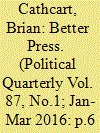

|
|
|
|
|
| Summary/Abstract |
Writing recently in The Political Quarterly, the journalist John Lloyd took issue with regulatory remedies for ‘bad journalism’ in the United Kingdom that were proposed by the Leveson inquiry of 2011–12 and endorsed by Parliament in 2013 in the form of a Royal Charter. State action will fail, he asserted, because only journalists can change journalism, and he urged British journalists to undertake this transformation. This response argues that Lloyd dismisses the Leveson process too lightly and takes too little account of the many victims of press abuses, who are entitled to better protection. A decent society had to do something about this, and the Leveson Charter process was a measured and constructive response that offers the best hope of higher press standards and of protection for ordinary citizens while safeguarding freedom of expression for journalists. Lloyd's proposal for action by journalists, by contrast, is impractical, not least because it ignores powerful forces preventing journalists from taking control.
|
|
|
|
|
|
|
|
|
|
|
|
|
|
|
|
| 2 |
ID:
144831
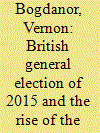

|
|
|
|
|
| Summary/Abstract |
Many on the left hoped that the 2015 general election in Britain would prove a social democratic moment. Instead, it proved a nationalist moment, since the only parties radically to increase their vote were UKIP and the SNP. This mirrored trends on the Continent, where nationalist parties on the right and the left have been the beneficiaries of the financial collapse of 2008. These parties exploit a new social cleavage between those who benefit from globalisation and those left behind. The new parties exploit issues of identity rather than economics, and these issues—whether Britain remains in the European Union, whether mass immigration continues and whether Scotland remains in the United Kingdom—are likely to dominate the 2015 parliament.
|
|
|
|
|
|
|
|
|
|
|
|
|
|
|
|
| 3 |
ID:
144840
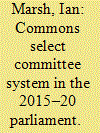

|
|
|
|
|
| Summary/Abstract |
The House of Commons select committees witnessed some of the most constructive political theatre of the 2010-2015 Parliament. Recall Rupert Murdoch's public contrition, Margaret Hodge's assault on MNC tax evasion and Keith Vaz's timely interrogations of G4S, etc. The committees also embraced social media and adopted public engagement as a key task. These developments all reflect a newly emboldened system. In recent months, four reports have been published which reflect on these developments. They also look forward to the further substantial development of committee activity. The system thus sets sail with an abundance of specific suggestions, including ideas that could have far wider and more far-reaching democratic implications.
|
|
|
|
|
|
|
|
|
|
|
|
|
|
|
|
| 4 |
ID:
144828


|
|
|
| 5 |
ID:
144832


|
|
|
|
|
| Summary/Abstract |
During 2015 Prime Minister Cameron found himself under intense domestic and international pressure over his apparent reluctance to maintain United Kingdom defence spending at the NATO target level of 2 per cent of GDP. Most commentators attributed this reluctance to the inevitability of defence cuts if the government wished to meet its deficit reduction targets. However, the aftermath of the general election saw a sudden decision to maintain UK defence spending at the NATO target level. This u-turn is one of the more curious episodes in recent British defence policy. In this article we explore the reasons why, at a time of continuing cuts and austerity measures and against all the political signals, a decision was made to meet the 2 per cent target, and what this means for the UK's defence policy. In doing so, we analyse why most commentators assumed that defence cuts were inevitable, the domestic and international factors that explain the government's apparent u-turn and what this revised defence budget settlement meant for the new 2015 National Security Strategy and Strategic Defence and Security Review.
|
|
|
|
|
|
|
|
|
|
|
|
|
|
|
|
| 6 |
ID:
144839
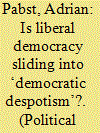

|
|
|
|
|
| Summary/Abstract |
Post-democracy and cognate concepts suggest that the postwar period of democratisation has given way to a concentration of power in the hands of small groups that are unrepresentative and unaccountable, as exemplified by the rise of multinational corporations and their influence on democratic politics. This article goes further to argue that this does not fully capture the triple threat facing liberal democracy: first, the rise of a new oligarchy that strengthens executive power at the expense of parliament and people; second, the resurgence of populism and demagogy linked to a backlash against technocratic rule and procedural politics; third, the emergence of anarchy associated with the atomisation of society and a weakening of social ties and civic bonds. In consequence, liberal democracy risks sliding into a form of ‘democratic despotism’ that maintains the illusion of free choice while instilling a sense of ‘voluntary servitude’ as conceptualised by Tocqueville.
|
|
|
|
|
|
|
|
|
|
|
|
|
|
|
|
| 7 |
ID:
144826
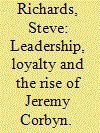

|
|
|
| 8 |
ID:
144827


|
|
|
| 9 |
ID:
144835


|
|
|
|
|
| Summary/Abstract |
Events since I published my book Post-democracy in 2004 suggest that democracy continues to decline in effectiveness in those parts of the world where it has been most strongly established. The global financial crisis, the consequent euro crisis, the likely shape of a Transatlantic Trade and Investment Partnership (TTIP) and growing evidence of the political power of giant mass media corporations all suggest that the dominant forces in today's politics are not those of democratic will. Movements like Syriza in Greece possibly suggest a democratic reawakening, but that is too early to determine. Meanwhile, it is important also to be aware of democracy's limits, and to try to resolve the problem of post-democracy by extending its reach beyond its competence.
|
|
|
|
|
|
|
|
|
|
|
|
|
|
|
|
| 10 |
ID:
144837
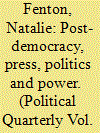

|
|
|
|
|
| Summary/Abstract |
Transnational media corporations now wield enormous power and influence. Never has this been displayed so starkly and so shockingly as in the revelations that emerged during the Leveson Inquiry into the culture and ethics of the press in the UK. This paper considers the implications of the relationship between media elites and political elites for democratic culture and media reform. The paper argues that the culture of press–politician mutual interest in which media executives and party leaders collude will continue as long as the solutions proffered focus on the ethical constraints of professional journalists rather than wider structural issues relating to plurality of ownership and control and funding of news in the public interest.
|
|
|
|
|
|
|
|
|
|
|
|
|
|
|
|
| 11 |
ID:
144838


|
|
|
|
|
| Summary/Abstract |
In recent years many scholars have diagnosed a crisis of party politics. This article considers recent changes in the UK and Europe that appear to challenge this idea. Exploring Colin Crouch's notion of ‘post-democratic’ party politics and considering his diagnosis of shifts in parties' agenda setting, organisation and communication, the article considers evidence of post-democratic politics and the possibility for future renewal.
|
|
|
|
|
|
|
|
|
|
|
|
|
|
|
|
| 12 |
ID:
144830
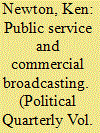

|
|
|
|
|
| Summary/Abstract |
This article provides an accessible overview of the growing research literature on the impact of public service and commercial broadcasting and highlights its main implications for policy discussions about the future of public service broadcasting in Western societies. It shows that the populations of countries with public service broad- and narrowcasting are better informed about government and politics, are more trusting of other people, have more positive civic attitudes, have greater confidence in democratic institutions and are more likely to engage in democratic politics. Moreover, levels of social trust are higher in countries which have a significant public service element in their media systems, even among individuals who do not habitually watch public TV channels. The article ends with a brief discussion of the implications of this research for the future of public broadcasting in the Western world.
|
|
|
|
|
|
|
|
|
|
|
|
|
|
|
|
| 13 |
ID:
144834
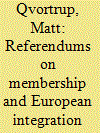

|
|
|
|
|
| Summary/Abstract |
There are many myths about referendums. The most common one is that voters are inherently sceptical and tend to vote no when given the opportunity. This article analyses some of the commonly held ‘truths’ about referendums on EU matters. Based on a statistical analysis of all forty-three EU-related referendums since 1972, it shows that governments tend to lose referendums if they have been in office for a long time, that emotive words on the ballot paper are correlated with a high yes vote and that a high turnout is correlated with a vote against European integration, but campaign spending is inconsequential. Based solely on statistical evidence from the previous forty-three referendums, the opponents of EU membership will win the Brexit referendum.
|
|
|
|
|
|
|
|
|
|
|
|
|
|
|
|
| 14 |
ID:
144833


|
|
|
|
|
| Summary/Abstract |
Critics concerned with the effect of public utility companies' market practices have primarily focused on issues of disconnection and inequality. This article goes further, challenging the very premise on which the model is based: the principle of individual choice. The article focuses on the French gas, electricity and telephone sectors, developing two points. The first is the declining trust in public utility companies and a certain choice-averseness. The second point addresses the experience of the ‘customer’, pressured to make the ‘right’ choice through manipulation and misinformation on the part of competing suppliers. Thus, instead of ‘active customers’ directing markets through their ‘choices’, what is seen is the disaffection or weariness of customers in the face of what they perceive as an unfair situation.
|
|
|
|
|
|
|
|
|
|
|
|
|
|
|
|
| 15 |
ID:
144836


|
|
|
|
|
| Summary/Abstract |
This article considers the problem of extraterritorial human rights violations committed by transnational corporations (TNCs), and draws on Crouch's framework in Post-democracy to illustrate why the issue has proved so difficult for states to regulate. I begin by examining the problem of corporate regulation more generally, and set out Crouch's analysis to show why and how corporations have become so influential. The second section considers the area of business and human rights, and explains why there is ‘a governance gap’ in relation to extraterritorial human rights violations committed by corporations. The third section describes efforts at the international and domestic levels to regulate corporations in relation to this issue. It concludes that while new international principles and innovative hybrid schemes are playing a valuable role in norm creation and standard-setting, the enforcement of these principles remains limited. Corporations have largely succeeded to date in their lobbying efforts to remain free of any direct obligations under international law.
|
|
|
|
|
|
|
|
|
|
|
|
|
|
|
|
| 16 |
ID:
144829


|
|
|
|
|
| Summary/Abstract |
The British Labour party's recent adoption of a partially open primary for the selection of its leader conforms to a trend seen across many European political parties of increasing rights and privileges in internal party decision-making and expanding opportunities for more loosely affiliated supporters to participate in party activity. This dual trend can be seen as a response to changes in the membership environment, greater individualisation of political participation and growth in social movement politics and online activism. Yet as much as parties are responding to a changed membership environment, they are also driving that change, increasingly blurring the distinction between members and supporters. This article examines the recent impact of this change within the British Labour party and argues that, in line with Susan Scarrow's theory of ‘multi-speed’ membership, the Labour party's experiment in expanding affiliation options has led directly to a tension in locating the source of authority within the party, creating a challenge for its new leader in accommodating his new supporters within his party's representative traditions.
|
|
|
|
|
|
|
|
|
|
|
|
|
|
|
|
|
|
|
|
|